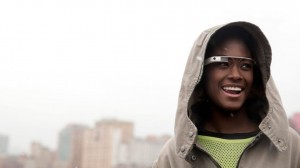Personal privacy is over.
The world knows more about you than you do and soon it will know even more.
We can keep fighting the battle to secure our privacy or we can learn how we need to live in the coming age where all of our actions are potentially in public view.
Before you get worried that I am going all political on you, don't worry, I'm not condoning the invasion of personal privacy or the eradication of it, but at the same time I'm not supporting it either.
I'm simply looking at the patterns that are emerging as the technology of our society increases, making this transformation inevitable.
I'm actually staunchly opposed to expressing my political thoughts publicly from any forum, even from my own blog, and I often recommend others do the same, mostly because of this transformation that is taking place. I'll talk more about that a little later on, but first let me tell you why privacy is indeed dead or at the very least dying.
It's more than Google Glass
Google Glass itself may not change the concept of personal privacy, but wearable computing is certainly the future.

What Google Glass does do, is sets up the stage for wearable computing to go mainstream.
I hear many people complaining about Google Glass saying that they would never wear the technology in public, because they would look like a geek or a dork.
But, this is exactly what makes innovations like Glass so important. The first thing that changes in society is perceptions.
Google Glass may not have the momentum to bash through the barrier of the “dorkiness” of wearing a computer on your head, but it will make a dent in that wall and over time that wall will come crashing down.
When everyone is wearing cameras it will be impossible to control them
We've already been through this before.
We've been through it at least two times that I can think of.
First, there was the USB drive.
All of a sudden we could plug a small device into just about any computer and pull data off of it or put data on it.
Computers without disk drives or network access were no longer inaccessible.
The data on them was no longer securable.
Sure, many companies tried to make it so PCs in their buildings were secured, but most companies realized that they would just have to deal with this new reality. You had to realized that if a person had access to data on a computer, they could take that data home if they wanted to.
The same type of thing happened when all cell phones started getting quality cameras on them.
Secure facilities tried to prevent people from taking pictures by disallowing employees to bring in cell phones that had cameras, but that didn't last long.
It became apparent pretty quickly that it would be just about impossible to prevent human beings who now were part human, part iOS or Android, from bringing their cell phone into a building. And, even if you could, someone who really wanted to take a picture would find another way. The technology that brought tiny cameras to the backs of every cell phone also pioneered the mass creation of tiny cameras that could easily be hidden anywhere.
Already governments and family matters have been thrust into public view
We currently live in a society where it is just about impossible for public figures or government to do an action in public and try to keep it secret.
Think about all the times in the last few years when a police officer stepped over the line or a government tried to quell a public protest by using violence or excessive force.
Each and every time, not only was there photographs and videos of the incidents, but the information spread to the entire world almost instantly through mediums like Twitter and Facebook.
The fact of the matter is, it is almost impossible to hide or cover up anything that occurs in public view.
Consider the amazing and tragic events that recently occurred at the Boston Marathon. In a huge crown of people, it only took about a day to identify two suspects out of the thousands of people in the crowd using images and video provided by the public.
This event was significant, because it showed that even when people aren't trying to capture data about you in public, they are capturing data.
You don't have to worry about the government tracking you. The government doesn't have the power or capability to do it. Instead, you are tracking yourself, you are tracking the government.
Oh, and if you still think family matters are private, you probably haven't heard of this thing called Facebook.
Don't think you can get a divorce, or even get into a heated argument with your teenager and not have it become public knowledge on Facebook.
The problem is that there are too many leaks now to private family matters and it is too easy for those leaks to spread the information.
Worse yet, those naked pictures you took of yourself, or unfortunately your less worldly-wise teenager took of themselves, that you thought no one would see… all I can say is “good luck with that.”
The reality is the trend against privacy will not reverse
Not only are you willingly providing your own private information, but companies are actively mining it.
From tracking cookies, to search histories, to friends graphs, advertising link clicks, foursquare check-ins, what you post on Twitter and more, everything is being recorded and tracked.
Each piece of information by itself is not very valuable, but when you combine all this information together, a very real and precise silhouette begins to emerge from that frosted glass window you are hiding behind.
And, like I said before, even if Google Glass is not successful, it will not be long before every human walking around in public and in private wearing a camera that not only you can't control, but likely you won't even be able to see.
Not only will we all eventually be wearing cameras, but the data from those cameras will be instantly uploaded to the cloud, where it will become a permanent record.
There are several unstoppable factors that will continue to improve over time, which will fuel this trend:
- Miniaturization of technology
- Increase in efficiency of batteries
- Increase in processing power
- Prevalence of social networks
As technology gets smaller and is able to be more mobile, and the ability to crunch big data and distribute data through social networks increases, privacy will greatly diminish.
The reality is we are transitioning from a society where private is default and public is a choice, to one where public is default and making things private requires considerable effort and in some cases is impossible.
How to live in this new “public by default” world
Rather than uselessly spending our energies trying to fight the trend of the world, it is better to spend those energies tempering our behavior to fit the world we are living in and will soon be born into.
It starts with getting in the habit of assuming everything we put on the internet will not only be made public, but will likely be a permanent record that is easily searchable.
Many times throughout the day I watch my Twitter or Facebook feed fly by and I cringe at all the people who are posting their own private opinions that should not be made public.
I'm not saying you can't have an opinion, but I am saying that you have to be wary that the opinions you express will become visible by more than just the people you share them with and will become a permanent record which you cannot be alienated from.
Are you a republican? Are you a democrat? Perhaps you are a libertarian or a communist? Do you support gun control? Are you pro-choice?
Good! Stand for something, but there isn't much of a need to say it out loud. Let your actions stand for you, they are more powerful than words anyway.
The problem with tweeting about your political views is that they may change. You might be leaning one political direction today, but 5 years from now, you have changed your mind completely. But, guess what won't ever change? That's right, the permanent record of what you said on the internet. If you ever decide to run for office or even go on a date, those words you said may come back to haunt you.
And even if your mind doesn't change, do you really want to decisively set half of the world population directly against you? I can't image many scenarios where this is a good idea. Even in politics, bipartisan political figures are usually much more successful. (Ok, I made that up, but I think it's true.)
I'm getting a little bit away from the point, but what I am trying to say is that you need to strongly consider things before you put them on the internet, because what you say online is public and permanent.
It goes beyond just the internet of course, even though it may start there.
We have to prepare ourselves for a world in which the moment we step out our door our actions are recorded.
In this kind of world, we have to be careful not to try to hide things that are likely to be destructive to us if revealed, because we know that what is hidden is likely to be revealed.
It means being more upfront and honest in our dealings and being careful to manage our image to make the focus be on the images and presentation that we desire while diminishing the focus on the image we do not desire.
When you don't have control over the information itself, you have to instead focus on controlling how that information is presented.
It all comes down to living in such a way that clearly reflects the values you are trying to represent and knowing that perception is 100 times more important than reality.
There is no time like the present
If you are still living like you can hide your tracks and like your track record doesn't matter, you'd better stop now, before it's too late!
The answer isn't to try to find better hiding places for your secrets and to try to wall yourself away from the world, but instead of accept the reality of the situation and find the best way to adapt to it.
“Man is not what he thinks he is, he is what he hides.”
― André Malraux

